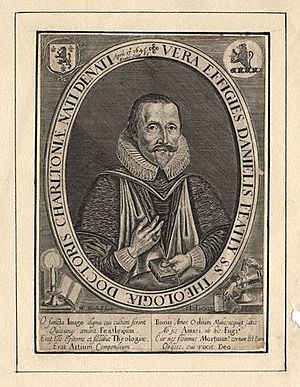Daniel Featley facts for kids
Daniel Featley (born March 15, 1582 – died April 17, 1645) was an important English religious scholar and debater. He was also known as Fairclough. During the 1640s, he faced challenges with the English Parliament because he was loyal to Charles I of England, the King. This led to him being treated unfairly and put in prison later in his life.
Contents
Early Life and Education
Featley was born in Charlton-upon-Otmoor, Oxfordshire, on March 15, 1582. His father, John Fairclough, was a cook at Magdalen College, Oxford and later at Corpus Christi College, Oxford. Daniel was the first in his family to use the last name Featley.
He started his education as a singer (chorister) at Magdalen College. John Rainolds, who was the President of Corpus Christi College, became his godfather and helped him a lot. Rainolds was a well-known Puritan leader. Featley became a scholar at Corpus Christi College in 1594 and later a fellow in 1602. He earned his first degree (B.A.) in 1601 and his Master's degree (M.A.) in 1606. He became known for his strong debating skills and his sermons. In 1607, he gave a speech at Rainolds' funeral.
Chaplain and Debater
From 1610 to 1612, Featley worked as a chaplain for Sir Thomas Edmondes, who was the English ambassador in Paris. While there, he became famous for speaking out against Catholic beliefs and for debating with Jesuits. He later published 21 of the sermons he preached in the ambassador's chapel.
In 1613, he earned his Bachelor of Divinity (B.D.) degree. He also served as a chaplain for George Abbot, who was the Archbishop of Canterbury. In 1617, Featley earned his Doctor of Divinity (D.D.) degree.
In 1619, Archbishop Abbot appointed Featley as the rector (head priest) of St Mary-at-Lambeth church. He also held other church positions, including the rectory of All Hallows, Bread Street and later Acton.
In 1623, Featley took part in a famous debate with two Jesuits, John Piercy and John Sweet. King James I himself was interested in Featley's debates and even asked to discuss religious topics with him.
In 1622, Featley married Mrs. Joyce Halloway. She owned a house in Kennington Lane, where they lived. For a while, he kept his marriage a secret because he was worried it might affect his work with Archbishop Abbot. In 1625, he stopped being Abbot's chaplain after a misunderstanding about an illness.
During the Reign of Charles I
Featley also served as a chaplain to Charles I of England. In 1630, he became the Provost (head) of Chelsea College. He wrote a popular religious guide called Ancilla Pietatis in 1626, which was even a favorite book of King Charles I during his difficult times.
Featley was a strong supporter of the Church of England and its system of bishops (episcopacy) in the 1640s. He had some disagreements with William Laud, who became Archbishop after Abbot. For example, in 1636, Laud ordered parts of Featley's book Clavis Mystica to be removed because they criticized Catholics.
Challenges During the Civil War
In 1641, Featley was chosen by the House of Lords to be part of a group that met in the Jerusalem Chamber to discuss religious matters. As the First English Civil War began, his life became more difficult. In November 1642, after the Battle of Brentford, some soldiers from the Earl of Essex's army damaged his property and the church in Acton.
On February 10, 1643, during a church service, soldiers tried to attack Featley at Lambeth Church, but he had been warned and was not there. Sadly, two church members were injured and died.
Featley was later brought before a committee and accused of various things by some of his parishioners. He was removed from his church position in Lambeth. He was offered a teaching position in Leyden (in the Netherlands) but declined due to his age.
He attended the Westminster Assembly, a meeting of religious leaders, where he spoke in favor of the Church of England's structure. He also disagreed with some of the new religious ideas being discussed. Because of a message from King Charles, Featley eventually left the assembly.
Soon after, he was found to be communicating with Archbishop James Ussher, who was with the King. Because of this, Featley was put in prison. His church positions and library were taken away, and he lost many of his belongings.
Imprisonment and Final Debates
While in prison, Featley continued his religious debates. At the request of Parliament, he wrote a book against Catholics. He was allowed to borrow three books from his library at a time to help with his writing.
In 1644, he published a challenge to the Puritan religious leaders of the time, offering to defend the Church of England's beliefs and practices. He also debated with Henry Denne, a Baptist minister who was also imprisoned. Featley had previously debated with other Baptists in 1643, and he wrote about it in his well-known book, The Dippers Dipt.
Featley's health was poor before he was imprisoned. After 18 months in prison, he was allowed to move to Chelsea College for better air. He passed away there on April 17, 1645, from asthma and dropsy (a condition where the body swells with fluid). He was buried in Lambeth church.
Works and Legacy
Daniel Featley was part of the team that translated the King James Version of the Bible. He worked on the later books of the Old Testament.
He wrote many books and sermons throughout his life, often focusing on defending the Church of England and debating with those who held different religious views. His writings were important in the religious discussions of his time.
Images for kids
 | Aurelia Browder |
 | Nannie Helen Burroughs |
 | Michelle Alexander |



